8 start with N start with N
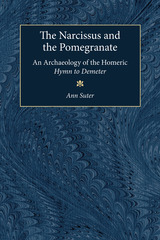
The author analyzes the traditional language of the hymn and Persephone's retelling of her story to Demeter, arguing that the hymn involves an earlier tale of Demeter and Persephone that predates the seventh century. Suter uses anthropological applications to illustrate that the story of Persephone's abduction does not reflect a female initiation rite into adulthood, as has been argued, but rather an hieros gamos. These methodologies point to the conclusion that Persephone was once a powerful goddess in her own right, independent of Hades and of Demeter as well. To test the accuracy of these possibilities, the book next examines evidence from outside the hymn. Other versions of the two myths in the hymn support the idea that these myths--Persephone's abduction and Demeter's nursing of Demophoön--were once separate and were late combined to create a new story. Evidence from the chief archaeological sites, from vase painting and other artistic forms is provided to enhance the argument. Thus the evidence from outside the hymn supports the conclusions of the textual analyses, giving surprising substantiation that the hymn itself commemorates the early days of the worship of the goddesses as a mother/daughter pair.
This book will be of particular interest to scholars of religious history, art history, archaeology, and literature. It is also accessible to the general reader interested in Greek literature, myths, and religion.
Ann Suter is Associate Professor of Classical Studies, University of Rhode Island.

The preeminent lyric poet of ancient Greece.
Of the Greek lyric poets, Pindar (ca. 518–438 BC) was “by far the greatest for the magnificence of his inspiration” in Quintilian’s view; Horace judged him “sure to win Apollo’s laurels.” The esteem of the ancients may help explain why a good portion of his work was carefully preserved. Most of the Greek lyric poets come down to us only in bits and pieces, but nearly a quarter of Pindar’s poems survive complete. William H. Race now brings us, in two volumes, a new edition and translation of the four books of victory odes, along with surviving fragments of Pindar’s other poems.
Like Simonides and Bacchylides, Pindar wrote elaborate odes in honor of prize-winning athletes for public performance by singers, dancers, and musicians. His forty-five victory odes celebrate triumphs in athletic contests at the four great Panhellenic festivals: the Olympic, Pythian (at Delphi), Nemean, and Isthmian games. In these complex poems, Pindar commemorates the achievement of athletes and powerful rulers against the backdrop of divine favor, human failure, heroic legend, and the moral ideals of aristocratic Greek society. Readers have long savored them for their rich poetic language and imagery, moral maxims, and vivid portrayals of sacred myths.
Race provides brief introductions to each ode and full explanatory footnotes, offering the reader invaluable guidance to these often difficult poems. His Loeb Pindar also contains a helpfully annotated edition and translation of significant fragments, including hymns, paeans, dithyrambs, maiden songs, and dirges.
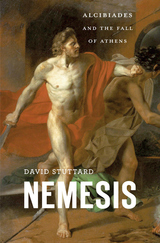
Alcibiades was one of the most dazzling figures of the Golden Age of Athens. A ward of Pericles and a friend of Socrates, he was spectacularly rich, bewitchingly handsome and charismatic, a skilled general, and a ruthless politician. He was also a serial traitor, infamous for his dizzying changes of loyalty in the Peloponnesian War. Nemesis tells the story of this extraordinary life and the turbulent world that Alcibiades set out to conquer.
David Stuttard recreates ancient Athens at the height of its glory as he follows Alcibiades from childhood to political power. Outraged by Alcibiades’ celebrity lifestyle, his enemies sought every chance to undermine him. Eventually, facing a capital charge of impiety, Alcibiades escaped to the enemy, Sparta. There he traded military intelligence for safety until, suspected of seducing a Spartan queen, he was forced to flee again—this time to Greece’s long-term foes, the Persians. Miraculously, though, he engineered a recall to Athens as Supreme Commander, but—suffering a reversal—he took flight to Thrace, where he lived as a warlord. At last in Anatolia, tracked by his enemies, he died naked and alone in a hail of arrows.
As he follows Alcibiades’ journeys crisscrossing the Mediterranean from mainland Greece to Syracuse, Sardis, and Byzantium, Stuttard weaves together the threads of Alcibiades’ adventures against a backdrop of cultural splendor and international chaos. Navigating often contradictory evidence, Nemesis provides a coherent and spellbinding account of a life that has gripped historians, storytellers, and artists for more than two thousand years.

This companion to the two-volume Dumbarton Oaks Medieval Library edition and translation of the Histories by Laonikos Chalkokondyles is the first book-length investigation of an author who has been poorly studied. Providing biographical and intellectual context for Laonikos, Anthony Kaldellis shows how the author synthesized his classical models to fashion his own distinctive voice and persona as a historian.
Indebted to his teacher Plethon for his global outlook, Laonikos was one of the first historians to write with a pluralist’s sympathy for non-Greek ethnic groups, including Islamic ones. His was the first secular and neutral account of Islam written in Greek. Kaldellis deeply explores the ethnic dynamics that explicitly and implicitly undergird the Histories, which recount the rise of the Ottoman empire and the decline of the Byzantine empire, all in the context of expanding western power. Writing at once in antique and contemporary modes, Laonikos transformed “barbarian” oral traditions into a classicizing historiography that was both Greek and Ottoman in outlook.
Showing that he was instrumental in shifting the self-definition of his people from Roman to the Western category of “Greek,” Kaldellis provides a stimulating account of the momentous transformations of the mid-fifteenth century.
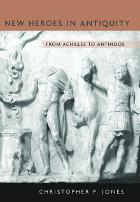
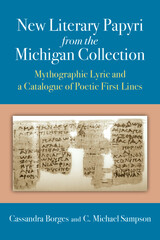
New texts from Greek antiquity continue to emerge on scraps of papyrus from the sands of Egypt, not only adding to the surviving corpus of classical and Hellenistic literature, but also occasionally offering a glimpse into how these poems were studied in antiquity. New Literary Papyri from the Michigan Collection: Mythographic Lyric and a Catalogue of Poetic First Lines presents three such new texts: an innovative lyric poem on the Trojan cycle, a scholarly anthology of lyric verses, and a brief but enigmatic third text. Cassandra Borges and C. Michael Sampson offer the original Greek text of these pieces, along with their scholarly commentary, analyzing their features in a variety of contexts—historical, cultural, poetic, mythological, religious, and scholarly.
The fragments collected here are of considerable antiquity (late third to second century BCE) a fact that is significant inasmuch as it places them among the oldest Greek papyri, but all the more so because in this period, a scholarly community was thriving in Ptolemaic Alexandria, the political and cultural capital of Hellenistic Egypt. The fragments bear witness to that scholarly activity: not only is their anthology of poetic verses consistent with other scholarly selections, but the very survival of these texts may well be at least partially indebted to the work of the Alexandrians in studying and propagating Greek literature in Egypt.
This edition supplements the 1970s work of Reinhold Merkelbach and Denys Page. Recent digitizing for the APIS project revealed a previously unsuspected join with other material, however, which alone warrants a new, comprehensive edition and analysis.
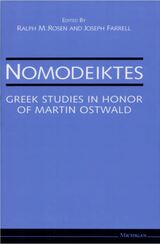
Nomodeiktes: Greek Studies in Honor of Martin Ostwald offers fascinating discussions of many of these areas, and it helps illuminate ways in which modern perceptions of this complex period are right and are wrong. Important observations are made on Greek historians and historiography, on politics and society, and on Greek philosophy and literature. The analyses of these major areas of investigation will be very useful for all interested in this centrally important period and for those who know the lure of that vivid and compelling city, Athens.
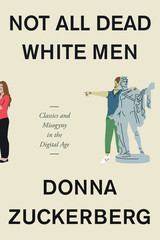
A Times Higher Education Book of the Week
A virulent strain of antifeminism is thriving online that treats women’s empowerment as a mortal threat to men and to the integrity of Western civilization. Its proponents cite ancient Greek and Latin texts to support their claims—from Ovid’s Ars Amatoria to Seneca and Marcus Aurelius—arguing that they articulate a model of masculinity that sustained generations but is now under siege. Not All Dead White Men reveals that some of the most controversial and consequential debates about the legacy of the ancients are raging not in universities but online.
“A chilling account of trolling, misogyny, racism, and bad history proliferated online by the Alt-Right… Zuckerberg makes a persuasive case for why we need a new, more critical, and less comfortable relationship between the ancient and modern worlds in this important and very timely book.”
—Emily Wilson, translator of The Odyssey
“Explores how ideas about Ancient Greece and Rome are used and misused by antifeminist thinkers today.”
—Time
“Zuckerberg presciently analyzes these communities’…embrace of stoicism as a self-help tool to gain confidence, jobs, and girlfriends. Their adoration of men like Marcus Aurelius, Epictetus, and Ovid…is founded in a limited and distorted interpretation of ancient philosophy…lending heft and authority to sexism and abuse.”
—The Nation
“Traces the application—and misapplication—of classical authors and texts in online communities that see feminism as a threat.”
—Bitch Media
READERS
Browse our collection.
PUBLISHERS
See BiblioVault's publisher services.
STUDENT SERVICES
Files for college accessibility offices.
UChicago Accessibility Resources
home | accessibility | search | about | contact us
BiblioVault ® 2001 - 2024
The University of Chicago Press









